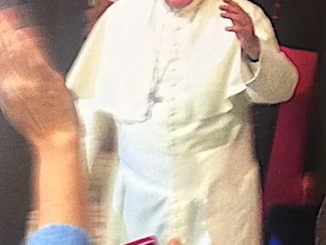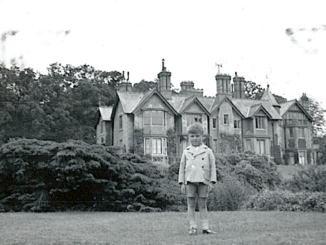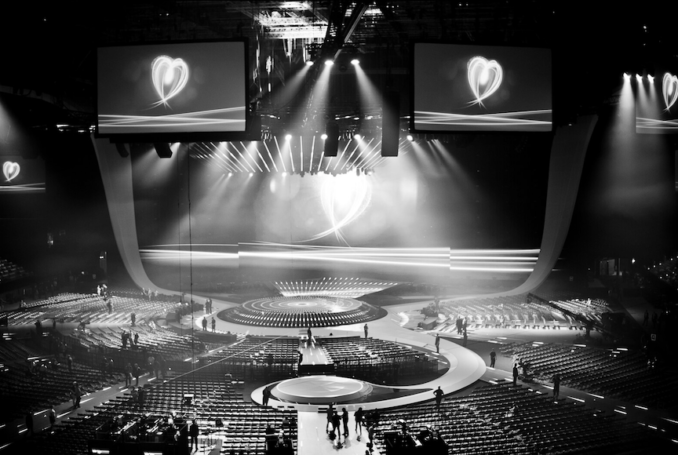
Eurovision Song Contest Dusseldorf 2011,
Frédéric de Villamil – Licence CC BY-SA 2.0
Who could have thought in the middle years of the twentieth century that the then-nascent Eurovision Song Contest could, a mere seven decades hence, be described by serious commentators as ‘noncing s***’? Albeit the commentator was Tommy Robinson (not his real name) and the method of delivery not the letters page Lugano’s Giornale del Populo but a more recent invention known as X.
For it was in Lugano, an exclusive Swiss lakeside resort, that the first Eurovision Song Contest was held in 1956. Not hosted in an outsized shed or soulless conferences centre (tonight’s event takes place in the awful Malmo Arena) but in the 1897 Achille Sfrondrini-designed neo-classical Theatro Kursall on the banks of Lake Lugano.
Again in contrast to the modern day’s tedious, monstrously over-long five-day event, the first contest began at 9 pm Central European Time on Thursday the 24th of May and lasted for only one hour and 40 minutes. There were seven contestants. Some sang more than one song. Swiss winner Lys Assia performed twice and in two languages. ‘Refrain’ was delivered in French and, as the name suggests, Lys sang ‘Das alte Karussell’ (The Old Carousel) in German.
Lys was to live to 94 and made her last public appearance aged 91 in a 2015 greatest hits event to mark the competition’s sixth decade. She also sang for Switzerland in 1957 and 1958 by which time Britain had entered the contest. We skipped the first event as the BBC were running their own.
In the early years, Eurovision wasn’t a competition for singers but rather for composers and songs. The idea being to offer songwriters an opportunity to platform work unpublished by the music industry. As such it was a development of the San Remo Music Festival which had begun in 1951.
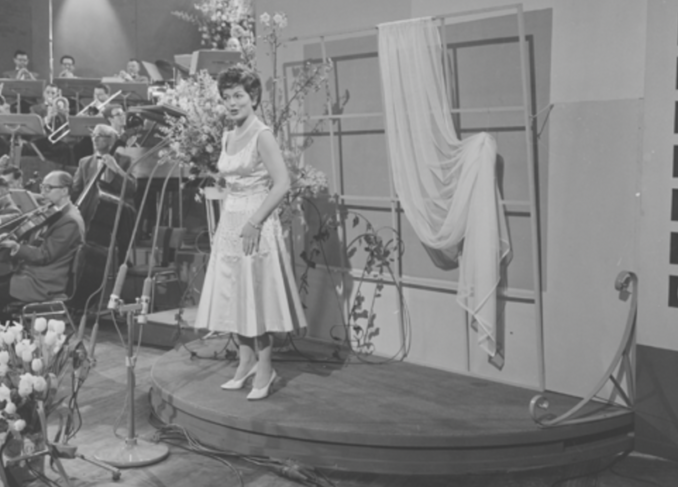
Lys Assia at the 1958 Eurovision Song Contest in Hilversum,
Nederlandse Televisie Stichting – Licence CC BY-SA 3.0
The fifties were early days for broadcast television too – especially of the transnational variety. In more innocent times, the week before the contest debuted one of Eurovision’s earliest efforts had been a Whit Sunday service broadcast from an Amsterdam church. Two days after the ground-breaking Lugano competition, pictures came direct from Berlin to England for the first time when Kenneth Wolstenhome commentated on the second half of an international between Germany and England.
Viewers missed Duncan Edwards’ first-half goal in front of 92,000 in Charlottenburg’s Olympiastadion but they did see Colin Grainger and Johnny Haynes seal a 3-0 victory in the second period. Rather than have clueless black girls mumble and mutter nonsense, Wendyball reporting in those days consisted of gentleman experts capturing the action and the listener’s imagination thus:
Duncan Edwards collected a clearance in the fashion of a wing-half, saw an opportunity to surge into attack, with brilliant ball control and great physical power he diddled three opponents and five yards into the area cracked the ball hard, low and true into the back of the net.
As for the rest of the team, Judes and Raheems were in short supply. Besides Duncan, Colin and Johnny, the England side consisted of Reginald (Matthews), Jeffrey (Hall), Roger (Byrne) and Ronald (Clayton). William ‘Billy’ (Wright), Gordon (Astall), Thomas (Taylor) and Dennis (Wilshaw). No substitutes in those days. Tragically, less than two years later, Edwards, Byrne and Taylor lost their lives during another trip to West Germany when they were among the 23 fatalities of the Munich air disaster.
Back in 1956, the first Eurovision Song Contest made the bottom half of the newspapers’ middle pages alongside headlines such as ‘Slavery Restored in Sierra Leone’ and ‘Films for Chinese Peasants.’ Interest grew as Great Britain joined the competition the next year when there were ten contestants each singing one song from a Frankfurt television studio.
For ourselves, Patricia Bredin performed ‘All’. The winner with 31 points was Corry Brokken with ‘Net als toen’. My Dutch is a bit rusty but one assumes the title to be similar in my more familiar Afrikaans, which would translate as ‘Just Like Then.’ Click below and treat yourself.
Ever the trooper, and despite leaving show business to become a lawyer, Ms Brokken went on to host the contest in 1976, won by the UK’s ‘Save Your Kisses for Me’ by Brotherhood of Man. And to be the voice delivering the Dutch jury’s scores in 1997, won by the UK again with Katrina And The Waves with ‘Love Shine a Light.’ Unavailable to bring limp and struggling Olly Alexander luck tonight, three times married Ms Brokken passed in 2016 aged 83.
Therefore, the 1958 contest entitled Grand Prix Eurovision de la Chanson Européenne 1958 came from the AVRO TV studios in Hilversum, Holland. In 1959, from the Palais des Festivals in Cannes, the theatre used to host the Cannes Film Festival. The following year London hosted for the first time at the Royal Festival Hall. One of three 1960’s British hostings, the new-ish BBC TV Centre welcomed sixteen acts in 1963 – one being a Nana Mouskouri early in her illustrious career. More of Nana later.
As a measure of the increasing success of the event, in 1968 the third London show required the Royal Albert Hall. The winner was Spain with the somewhat unimaginative, ‘La, La, La.’ The event was remarkable the following year as four acts tied for first place in Madrid’s Teatro Real. With no rule in the rule book to accommodate such an eventuality, lots were drawn to separate Lulu, Salome, Lenny Kuhr and Frida Boccara.
In a controversial competition, Austria refused to send an entry because of Spanish President General Franco (presumably he wasn’t wing enough) and Wales was disqualified for not being a sovereign state. At the end of hostilities, Lenny Kuhr, not her real name, Helena Hubertina Johanna Kuhr, won the ballot. Iva Zanicchi sat in thirteenth place. Remember that name!
The following year the contest returned to a Hilversum. Great Britain came second with Mary Hopkin’s and ‘Knock Knock Who’s There’ behind winners Great Britain – sort of. Northern Ireland’s Dana won with ‘All Kinds of Everything’ but the Ulster girl from Londonderry was representing the Free State.
In the run-up to the event the Daily Mirror was certain Mary Hopkin’s would win and in a further fake news fau pas announced, ‘song competitions are renowned as pretty banal events’. Many Continentals and all of the Scandinavians had lost interest. There were reports of ‘muffled rumours that this may be the last Eurovision Song Contest.’
Days later the ‘Derry’ Journal had the last laugh. A breathless correspondent noted,
REJOICING IN BOGSIDE Derry rejoiced on Saturday night when its eighteen-years-old queen of song, Dana (Rosemary Brown) brought all Europe to her feet with her striking success in the Eurovision Song Contest in Amsterdam, And nowhere was her triumph received with greater jubilation than in the Bogside.
There the focal point of the rejoicing was the Brown family apartments on the fifth floor of the multi-storey flats in Rossville Street. Rosemary’s father, Mr. Robery Brown, watched the contest on television with Rosemary’s brothers, John (16) and Gerard (14), and her sister Eileen. Also there was Rosemary’s young cousin, Richard Crawley, and her uncle, Mr. Bernard Sheerin
Never mind that tosh, no matter what you think of DeVellera’s Ireland half a century ago, it can’t be denied that Derry Lindsay and Jackie Smith’s composition is dead easy to sing. As clicking below may or may not prove:
Meanwhile, back at the Derry Journal,
The streets of the Bogside — indeed of the entire city were deserted while the contest was being televised but the moment the result was announced there was an invasion of the flats with wellwishers. The long corridor leading to the Brown apartments was crowded with residents of other parts of the multi-storey buildings and with neighbours from the surrounding district.
Mr Brown was overwhelmed with congratulations and at one stage he was chaired around the flats by delighted neighbours while a loudspeaker played Rosemary’s song. Derry is proud of you!”
Although the song contest has defied the naysayers, the bijou apartments of the Bogside’s Rossville multis haven’t. Although only built in the early 60s these were demolished two decades later.
The ordinary girl from Derry angle was somewhat disingenuous. The diminutive figure in a white mini-dress sat on a stool before 200 million TV viewers was the daughter of two musicians. If not a prodigy, then at the very least Dana showed remarkable talent from an early age. By the time of the contest, she was already a DECCA recording artist and a veteran of the Southern Irish dance hall circuit.
Not even Irish, Rosemary was born in London’s Islington, one of seven children, and moved to Londonderry with her family when aged five. No matter, sound on the rights of the unborn, church and family values, Dana, as Mrs Rosemary Scallon, went on to enjoy a career in politics, being an independent member of the European Parliament from 1999-2004.
She wasn’t the only one. Nana Mouskouri, who somehow represented Luxembourg at BBC Television Centre in 1963 with ‘À Force de Prier’ (‘Persistently Praying’), sat in the same assembly between 1994 and 1999 for Greece’s centre-right Nea Dimokratia party. As for Iva Zanicchi, the 1969 contestant was elected too but without being elected. A Forza Italia’s candidate in 2004, La Zanucci was next on the list when honest Mario Mantovani, subsequently convicted of corruption, extortion and auction disruption, failed to take up his seat.
As a result of the Amsterdam and Bogside multis excitment, the 1971 competition was held in Dublin at the 1,000-capacity Gaiety Theatre. This time two Northern Ireland girls featured. Clodagh Rodgers from Newry sang ‘Jack in The Box’ (finishing 4th) and 18-year-old Angela Farrell from Portadown sang the Republic’s entry ‘One Day Love’. The programme was shown live in 20 countries with a recording aired in a further 12, including the USA.
Then still a home for ballads and upbeat songs, in the following decades the competition became dark. I wonder what Mrs Dana Rosemary Scallon, now a mother of four grown-up children, or Tommy Robinson for that matter, would make of Ireland’s 2024 entry? An emaciated and tattooed goth gremlin witch named Bambie Thug ‘sings’ the gothic electro-metal anthem ‘Doomsday Blue’. Dear God.
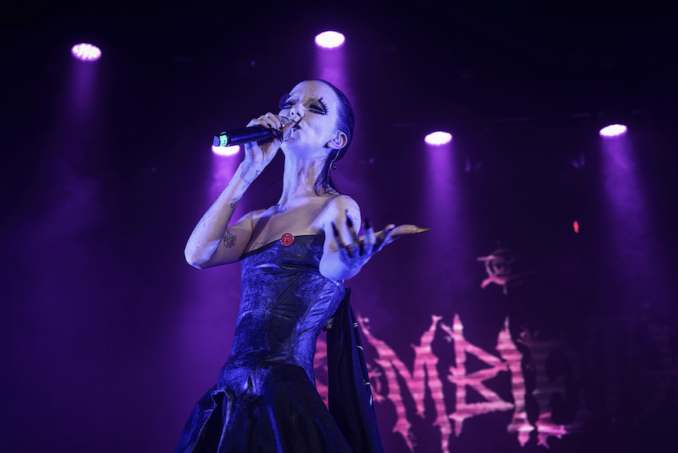
Bambie Thug,
Pedro J Pacheco – Licence CC BY-SA 4.0
Lyrics include:
I, I, I know you’re living a lie
I, I, I see the scars in your eyes
I, I, I know you’re living a lie
I, I
No thanks. When recalling Corry Brokken and the guy with the fiddle, an England team full of Englishmen, Mary Hopkins, Dana and an Amsterdam Whitsuntide in the 1950s, one can’t help but conclude the only thing worth voting for these days is the distant past.
© Always Worth Saying 2024

